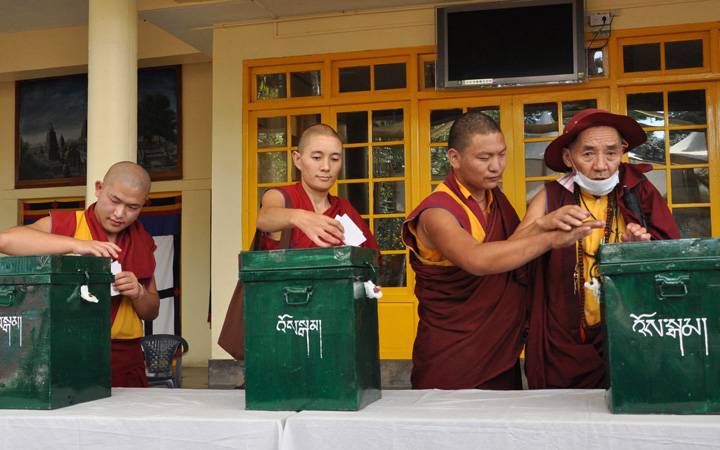
(TibetanReview.net, Jun26, 2016) – A committee constituted to recommend suggestions for reforming the Tibetan electoral process has on Jun 24 issued a notice invite suggestions from the Tibetan public. The members of the committee had been constituted on Jun 4 and begun functioning on Jun 20.
The reform is meant to amend provisions of the Tibetan electoral rules and regulations and the deadline for the Tibetan public to send suggestions is 05:00 pm, Aug 30, 2016. The suggestions have to be sent to the Tibetan Parliamentary Secretariat.
The suggestions have to focus on two issues: (1) Amendments to address the difficulties faced during the recently concluded Tibetan general election. (2) Suggestions on the issue of proposing candidates for the Sikyong and Tibetan Parliament in Exile members in future elections.
Those requiring further information are asked to contact the parliament secretariat, including through its email: tibetanparliament@tibet.net.



ELECTORAL LEGISLATION AND TRANSPARENCY
The 2016 election is finally over and we should be proud that it was a success in spite of few hick ups and missteps. The Tibetan community is not fallen apart as predicted by the Beijing government. Cholka is important but your nation comes first. It is an insult to the intelligence of the community if they think taking advantage of Cholka issue will help anybody.
Overall, the people showed their maturity and strength and voted with their conscience. The Election Commission, with its limited resources and man power, did their best. It does not mean there is no room for improvement. It is no fault of EC that there is inconsistence in every election session. When the election legislation is vague and not precise, the temporary patch works are bound to be inconsistent. There is fundamental flaw in the system how the EC is appointed and its terms.
Election integrity is of paramount importance. If you think your vote doesn’t matter, you lose faith in government in general. People need to have confidence that whatever the results of the election are, that they reflect the will of the majority of the people.
The electoral rules should be legislated by the House while it is fresh and there is time. The focus of point should be:
1) How to replace a sitting member in the event of his/her resignation or death. There have been inconsistence on such issues before.
2) What will be the benchmark for Sikyong candidates to include in the final run?
3) Election Commissioner term –
4) Campaign Financing
5) Registration of Political Party(s)
6) How to encourage voter registration and remove the barrier.
It is important that the timing of the communication and identification of the candidate are in no way related to a non-electoral event such as a scheduled vote on specific legislation by an officeholder who also happens to be a candidate for public office.
Until now all three Cholkhas are considered a regional welfare associations and as such accorded certain privileges and respect by the Administration. However, with 2016 election, this has changed and a new approach will be needed. Entities are considered as a political organizations, if party or association that is organized and operated primarily for the purpose of influencing the selection, nomination or appointment of any individual to any public office. All such regional and national political party(s) should be registered with Election Commission.
Such parties in writing agree to keep and furnish to the Commission such records, books, and other information as it may request, and agree to an audit and examination by the Commission. Election financing is a security issue, if not transparent. Campaign financing legislation is a must and who can and how much is important.
Election process starts from the registration until the result is declared. Every citizens of state is entitled and has the right to a free election and full participation. Full participation means you can choose to run for office, openly campaign, vote, and exercise oversight. Electoral right of citizen can be denied at local level if the conditions are made too rigid and complicated. An example for this would be a new arrival from Tibet asking for his birth certificate and documentations that is not possible in many cases for voter registration. There need to have other options to prove his/her identity and election legislation must spell those possible options.
Public oversight starts with transparency. Election transparency is the public ability to see and verify each essential step in elections, the essential steps being:
a) Candidates
b) Campaign – able to openly campaign
c) Who can vote (voter list)
d) Who did vote (poll list, or participating voter list?
e) Counting of the vote
f) Chain of custody.
Without public oversight you can participate in only the first few elements; it is elections in the dark, controlled by someone else, hopeful thinking rather than true participatory governance. If democracy is a day light created by its own audience, democracy without transparency is that audience blindfolded — trusting and hoping and not really knowing if they are having democracy at all.